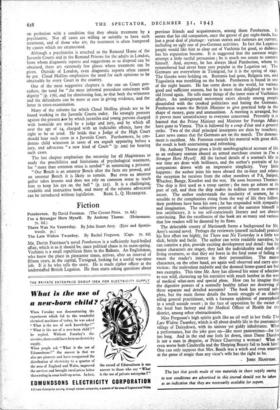Fiction
Pemberton. By David Footman. (The Cresset Press. 7s. 6d.) I'm a Stranger Here Myself. By Anthony Thorne. (Heinemann. 75. 6d.).
There Was No Yesterday. By John Stuart Arey. (Eyre and Spottis- woode. 9s.) The Late Widow Twankey. By Rachel Ferguson. (Cape. 75. 6d)
MR. DAVID FOOTMAN'S novel Pemberton is a sufficiently hard-boiled affair, which is as it should be, since political chaos is its main-spring. Vuchinia is a small republican State in the Balkans. An Englishman, who knew the place in pleasanter times, arrives, after an interval of fifteen years, in the capital, Tsrnigrad, looking for a useful war-time job. It is he who tells the story. He is made cipher officer at the understaffed British Legation. He then starts asking questions about previous friends and acquaintances, among them Pemberton. It seems that his old companion, once the gayest of gay night-birds, has lost a great deal of plumage: various stories and rumours are current, including an ugly one of pro-German activities. In fact the Legation people would like him to clear out of Vuchinia for good, so dubious has his reputation become. It is suggested that the narrator might attempt a little tactful persuasion ; he is much too astute to commit himself: And, anyway, he has always liked Pemberton, whom he remembered had never been very popular in the Legation set. The Germans are everywhere in Tsrnigrad, for it is the spring of 1941. The Greeks were holding on. Rumania had gone, Bulgaria too, and Yugoslavia was trembling on the brink. Pemberton is found in one of the night haunts. He has come down in the world, for various good and sufficient reasons, but he is more than delighted to see his old friend again. He tells many things of the inner state of Vuchinian affairs. An underground movement exists already among people dissatisfied with the crooked politicians and hating the Germans. Pemberton wants- the British Minister to give practical help in the shape of money, guns and ammunition. A meeting is arranged, but it proves most unsatisfactory to everyone concerned. Presently it is learned that the Prime Minister and Minister for Foreign Affairs have gone to Vienna. This is followed by a coup d'etat and a general strike. Two of the chief principal insurgents are slain by treachery. Later news comes that tote Germans are on the march. The denoue- ment is excellent. Mr. Footman controls his material with great skill, the result is both' entertaining and refreshing.
Mr. Anthony Thorne gives a lively autobiographical account of life as an ordinary seaman aboard an armed merchant cruiser in I'm a Stranger Here Myself.' All the factual details of a seaman's life in war time are done with brilliance, and the author's portraits of his companions drawn with an impressiVe simplicity. Very little happens : the author joins his mess aboard the ex-liner and relates the reception he receives from the other members of P.6, Striper, Whacker, Bungy, Knocker and the rest. He soon becomes Thomey. The ship is first used as a troop carrier ; the men go ashore at its port of call, and then she ship makes its tedious return as convoy escort. The author understands the insularity of seamen, he is sensible to the complexities rising from the way of life they follow, their problems have been his own ; he has responded with sympathy and imagination. The subjective portrait of the narrator himself is less satisfactory, it is too self-consciously literary and not always convincing. But the excellences of the book are so many and various
that few readers will be daunted by its flaws. •
The delectable county of Merioneth forms a background for Mr. Arey's second novel. Perhaps the reviewers (oneself included) praised his first effort too highly, for There was No Yesterday is a -little too slick, brittle and facile. The author can write readable narrative, he can contrive a plot, provide exciting development and detail : but his major characters are stagey, they lack the individuality and depth of living creatures, so that they are bores in the fatal sense of failing to rouse the reader's interest in their personalities. The minor characters, on the other hand, are again well observed and carry con- viction : the malevolent midwife and the doomed home-guard are but two examples. This time Mr. Arey has allowed his sense of selection to run wild, cluttering up his narrative with much lumber ,. in the way of medical what-nots and special pleas. How can he imagine that the digestive powers of a normally healthy infant are deserving of three separate and detailed accounts? The book has several sub- plots, but the main theme details the heroic struggle of an elderly ailing general practitioner, with a foreseen epidemic of paratyphoid in a small seaside resort ; in the face of opposition by the owner of the local bun factory and the Medical Officer of Health for the district, among other obstructionists.
Miss Ferguson's high spirits gush like an oil well in her frolic The Late Widow Twankey, which is all about double life in the pantomime village of Daisydown, with its sinister yet giddy inhabitants. What a performance, but the joke goes on-111e most pantomimes—for far
too long. And in the end one feels let down, since Dame Darden is not a man in disguise, or Prince Charming a woman! What is
even worse both Cinderella and the Sleeping Beauty fail to hook him! One can only suppose that Mrs. Beech was a witch and even smarter at the game of magic than any vicar's wife has the right to be.
JOHN. HAMPSON.
The fact that goods made of raw materials in short supply owing to war conditions are advertised in this journal should not be taken as an indication that they are necessarily available for export.






























 Previous page
Previous page